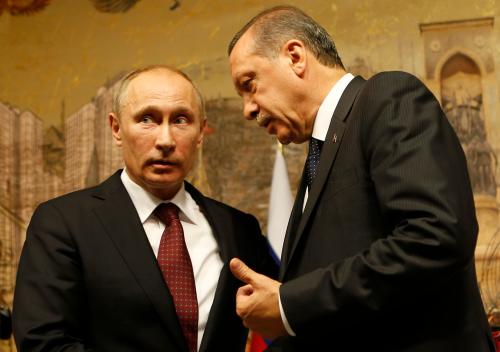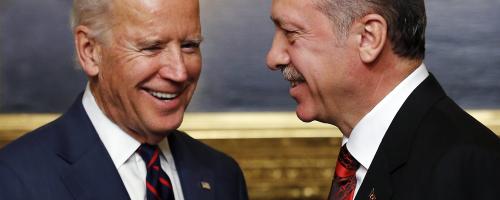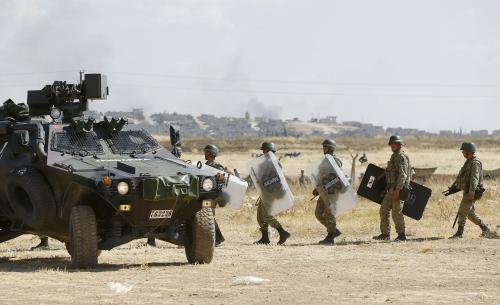Editors’ Note: The attempted coup in Turkey was, for many observers, reminiscent of another recent July uprising in a key American ally: the 2013 military takeover in Egypt. These coups were a disaster for U.S. policy in both cases, and would have been regardless of how they turned out, argues Jeremy Shapiro. This post originally appeared on Vox.
Friday’s attempted military coup in Turkey demonstrates that yet another U.S. partner in the Middle East seems to be descending into domestic unrest. The spectacle was, for many observers, reminiscent of another recent July uprising in a key American ally: the 2013 military takeover in Egypt. There, as in Turkey, a powerful military in a country with a history of coups rebelled against a democratically elected Islamist government.
Egyptians and Turks alike will naturally reject such comparisons and emphasize the unique nature of their respective situations—not least that the coup in Egypt succeeded and the one in Turkey failed. They have a point. The differences in the local political context are more important than the superficial similarities.
But from an American perspective, there is a key similarity: These coups were a disaster for U.S. policy in both cases, and would have been regardless of how they turned out.
In each case, the U.S. government’s immediate response to fast-moving situations was to issue bland statements urging calm and condemning violence. Regardless, it gets blamed for not acting forcefully enough, and often accused of directly instigating the violence. In the end, a relationship with the government that emerges is strained, both by such accusations and by the ensuing crackdown and human rights abuses that usually follow both successful and unsuccessful coups.
How does the United States end up in this no-win situation so frequently? Why is domestic unrest in faraway countries like Egypt and Turkey such a problem for the United States?
The essential problem is that the United States cannot just do foreign policy business with its partners. Because of America’s own values and domestic politics, it needs to get involved in their domestic political struggles. It needs to promote democracy and civil society in its partners and to take positions on controversial domestic issues such as the proper functioning of democratic institutions and the protection of human rights or media freedom.
This means that when domestic politics explodes, the United States is often caught in the middle.
Partnership isn’t enough
Both Egypt and Turkey are “key security partners” of the United States. This means the U.S. government needs these countries to deal with critical security issues.
Turkey is a NATO ally that sits at the crossroads of practically every geopolitical issue in the Middle East. It is particularly critical for the fight against ISIS. The United States and its anti-ISIS coalition partners supply their partners on the ground in Syria through Turkish territory and use the military base at Incirlik in Turkey to launch airstrikes against ISIS. The foreign fighters that replenish ISIS’s ranks have also often come into Syria via Turkey.
Egypt is also seen as an important partner for counterterrorism. It is struggling to cope with jihadist groups, some of them linked to ISIS, in the Sinai Peninsula. Egypt also provides the United States military with privileged access to the strategic Suez Canal, helps keep the peace with Israel, and helps ensure that weapons that might be used to attack Israel don’t get to Hamas through Egypt’s border with Gaza.
One could argue about whether these are truly important security interests for the United States. But the key point is that successive American governments since, in the case of Turkey in the 1950s and in the case of Egypt in the 1970s, have accepted that they are.
They have accordingly sought to build an effective partnership with both countries. The United States is committed, through NATO, to defend Turkey in case of aggression. And the United States provides Egypt with more than $1.3 billion a year in military assistance and $150 million a year in economic assistance, making it the second-largest recipient of U.S. foreign aid in the world (after Israel).
But the United States can’t just give these guarantees and this money without taking on some moral responsibility for what goes on in these countries. Debates over these countries in U.S. domestic politics reflects this sense of moral responsibility.
If the Egyptian military overthrows a democratically elected government, U.S. Congressmembers will quite naturally ask why the United States is giving nearly $1.5 billion a year to a government that shoots peaceful protesters in the street. If the Turkish government suppresses media freedom or arrests judges, U.S. human rights groups will similarly question why the United States accepts such actions by a NATO ally.
Hoping to escape from this dilemma, the U.S. government has long sought to promote the Western values of democracy and human rights in its security partners.
But particularly in the Middle East, this has rarely worked. The United States doesn’t really know how to democratize these societies, and in any case, it values its security relationship with the government too much to exert sustained pressure.
So even as the Egyptian military overthrew the democratically elected government, the United States continued to give it military aid. Even as Turkish President Recep Tayyip Erdoğan has moved in an increasingly authoritarian direction, the United States has stepped up its security cooperation with Turkey over ISIS.
The result is a hypocrisy that is evident and annoying to both the government and its opposition. Every effort to pressure governments on human rights elicits furious reactions and denials. And when, despite the rhetoric about human rights from U.S. officials, nothing really improves, the population grows cynical about U.S. motives.
So every effort to build up civil society organizations spawns a million conspiracy theories about U.S. involvement in domestic politics.
The crucible of a coup
Military coups or revolutions in U.S. partners always bring these tensions out into the open. They force the United States to confront in extremely fraught circumstances whether it most prizes its security relationship or its commitment to democratic values.
Usually, it can’t decide. The immediate reaction tends to be both muddled and seen through a lens of decades of built-up distrust of the United States. The conspiracy theorists find ample evidence for every preconceived notion.
The reaction to the Turkish coup has been a textbook example of this dynamic. The U.S. government condemned the coup, but it took several hours. The Turkish government interpreted this as hedging and evidence of ill will.
President Erdoğan has blamed the coup on Fethullah Gülen, a Muslim cleric in self-imposed exile in the United States, and wants the U.S. government to extradite him to Turkey.
When Secretary of State John Kerry said the United States would need solid evidence to extradite him, a Turkish government minister accused the United States of instigating the coup itself. As Kerry warned Turkey about the large number of arrests, the Turkish government temporarily restricted use of the Incirlik base and arrested its Turkish commander on suspicion of involvement in the coup. The conspiracy theorists went wild:
Ibrahim Karagul, Chief editor of pro-AKP daily: “The USA is behind this coup. I’m saying it clearly that the USA attempted to kill Erdogan.”
— Turkey Untold (@TurkeyUntold) July 19, 2016
If the United States wanted to break out of the vicious cycle, it would either have to end its security partnership with Turkey or accept that that partnership means accepting Turkish authoritarianism. But if experience is any guide, the United States will not take either of those paths.
As in Egypt, the U.S. relationship with Turkey will probably survive these events, albeit in diminished form. After a period of distancing, both sides will accept that they need each other for their mutual security problems too much to allow a complete breakdown.
But at the same time, the distrust of the United States within the government and the hatred of the United States within the population will grow. The U.S.-Turkey relationship will fail to evolve into a true alliance of trust and thus be of limited use in defeating ISIS or ending the civil war with the Kurds in Turkey.
In the meantime, Turkey’s roiled domestic politics will continue as Erdoğan attempts to cleanse Turkish politics of his opponents. The next coup or revolution may be the last that the strained U.S.-Turkish alliance can withstand.






Commentary
The coup conundrum
July 22, 2016